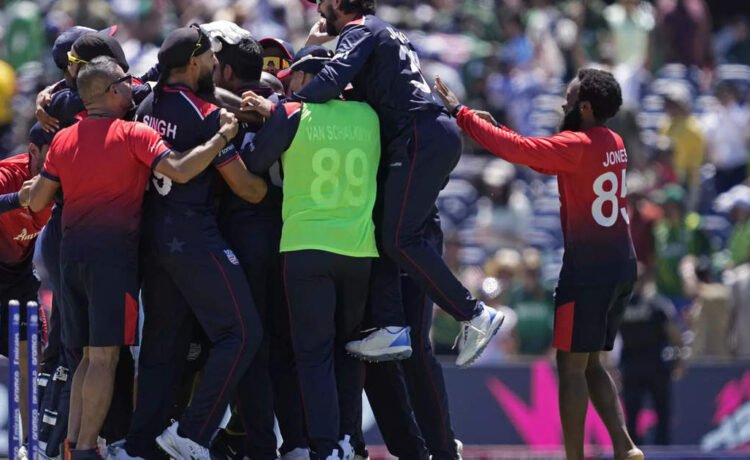Pakistan Vs USA: United States of India: From Ahmedabad, Ooty, Mumbai, Delhi, meet USA’s giant slayers

=========
The Ahmedabad-born captain of the team won the player of the match award for his half century and is one of the rare people, who shifted to basically pursue his cricketing career. He got a Green Card in 2010 and shifted to New Jersey permanently in 2016.
A hard-hitting right-hander, he also conducts coaching clinics and imparts cricket lessons to diaspora kids thrice a week when he is not on national duty. Initially, there were very few turf wickets in the USA and Monank has played a lot on matting as well as 20 and 30-over weekend club tournaments across the country.
Saurabh Netravalkar ============= The man of the moment after a killer Super Over and before that squaring up Mohammed Rizwan with an away swinger and fooling Iftikhar Ahmed with a low dipping slow full-toss, Netravalkar is the story of a successful marriage between academics and sports.
In 2010, he bowled against the likes of Joe Root, Jos Buttler, Ben Stokes, the golden batch of U-19 English cricketers, who played in that World Cup in New Zealand and ‘Netra’, as he was known back then, formed a potent pairing with fellow left-arm seamer Jaydev Unadkat and Punjab’s Sandeep Sharma.
However just like in Mumbai, being good isn’t enough and one needs to be the best to survive. With an engineering degree in Computer Science, the academically brilliant lad got a scholarship to pursue his MS from the prestigious Cornell University.
However, cricket never left him as he performed at all levels of US cricket to make a name for himself and stood tall with his decent show in Major League Cricket’s first edition which was headlined by many top T20 pros in world cricket.
Away from cricket, one can find him at Oracle’s office in Silicon Valley where he is a senior techie.
Harmeet Singh:
==========
Ian Chappell wanted him to be drafted into the Indian team after his exploits in the 2012 U-19 World Cup but as it was with many precocious talents, he lost his way. Driving a car inside a railway station found him detained by the cops and there were stories of indiscipline that flew thick and fast as Mumbai cricket turned its back on him.
He shifted to Tripura as a professional but with little success. He decided to migrate to the States and it turned out to be a good call. He has rediscovered his mojo and has been one of the most consistent performers including a recent series against Bangladesh. The extra runs he stole in the Super Over with the ball in Rizwan’s hands spoke volumes about his cricketing smarts.
Nosthush Kenjige:
===========
One doesn’t know if Kenjige has heard father of American music Stephen C Foster’s famous country song “I come from Alabama’ but born in that famous South eastern region, Kenjige’s journey as a Tamil-American is a fascinating one.
He had shifted with his parents as a child to Ooty and used to be a left-arm medium pacer before taking to spin at the age of 13. By the time he was 18, Kenjige’s parents sent him to Bengaluru where he played in KSCA’s first division league.
But once he knew that even breaking into Karnataka state side was tough, he decided to move back to his country of birth and pursue a course in bio-medical engineering.
He was done with cricket and didn’t even bother to pack his kit when he left for the States but his mother slipped in a cricket ball in his suitcase and rest was history. He landed a job in Washington DC where during evening games of squash, he came to know about club cricket in New York.
He subsequently left his job as a Bio-Medical officer and played for the USA from ICC’s WCL Division 4.
Milind Kumar:
=========
When Milind Kumar arrived, everyone envisaged a solid talent in Delhi circuit scene within seven years, he became a fringe player, who was often left to bat with the tail in Ranji Trophy. A shift to Sikkim in the Plate League and more than 1300 runs didn’t transform into a silver lining he was hoping for.
Post COVID-19, he migrated to the US and did well in domestic tourneys to find a place in the 15. Even for Delhi, he was a gun fielder and Iftikhar Ahmed would have found it the hard way in the Super Over. That catch diving forward after sprinting 10 yards from long-off boundary ended Pakistan’s hopes.
Nitish Kumar
========
It’s a very good time to be a Nitish Kumar whether in India or in the United States. Back in 2011 when MS Dhoni hit that towering World Cup winning six and Virat Kohli was just announcing himself as the next big thing, school-going Nitish had created a world record becoming the youngest to a play 50-over World Cup game at 16 years 283 for Canada against Zimbabwe.
Thirteen years since, the boundary he hit off the last delivery from Haris Rauf is his hour of glory. As Ian Bishop would have said: ‘Nitish Kumar, Remember the Name.”
Jaspreet “Jessy” Singh:
==============
Born in New Jersey, brought up in rural Punjab and in his teens back in the land of opportunities for good, Jessy has had to do those hard yards for the longest time.
In 2015, he was excluded from the US team that went to play a domestic 50 over competition in West Indies. Jessy left everything to double his practice hours.
In 2016, erstwhile US coach Pubudu Dassanayeke arranged for five first-class matches in Sri Lanka, where he learnt what hard work is all about. Over the past few years, he is an indispensable part of the pace attack with Pakistani Ali Khan. The delivery that got Babar Azam out would certainly be the ball of his career so far.










